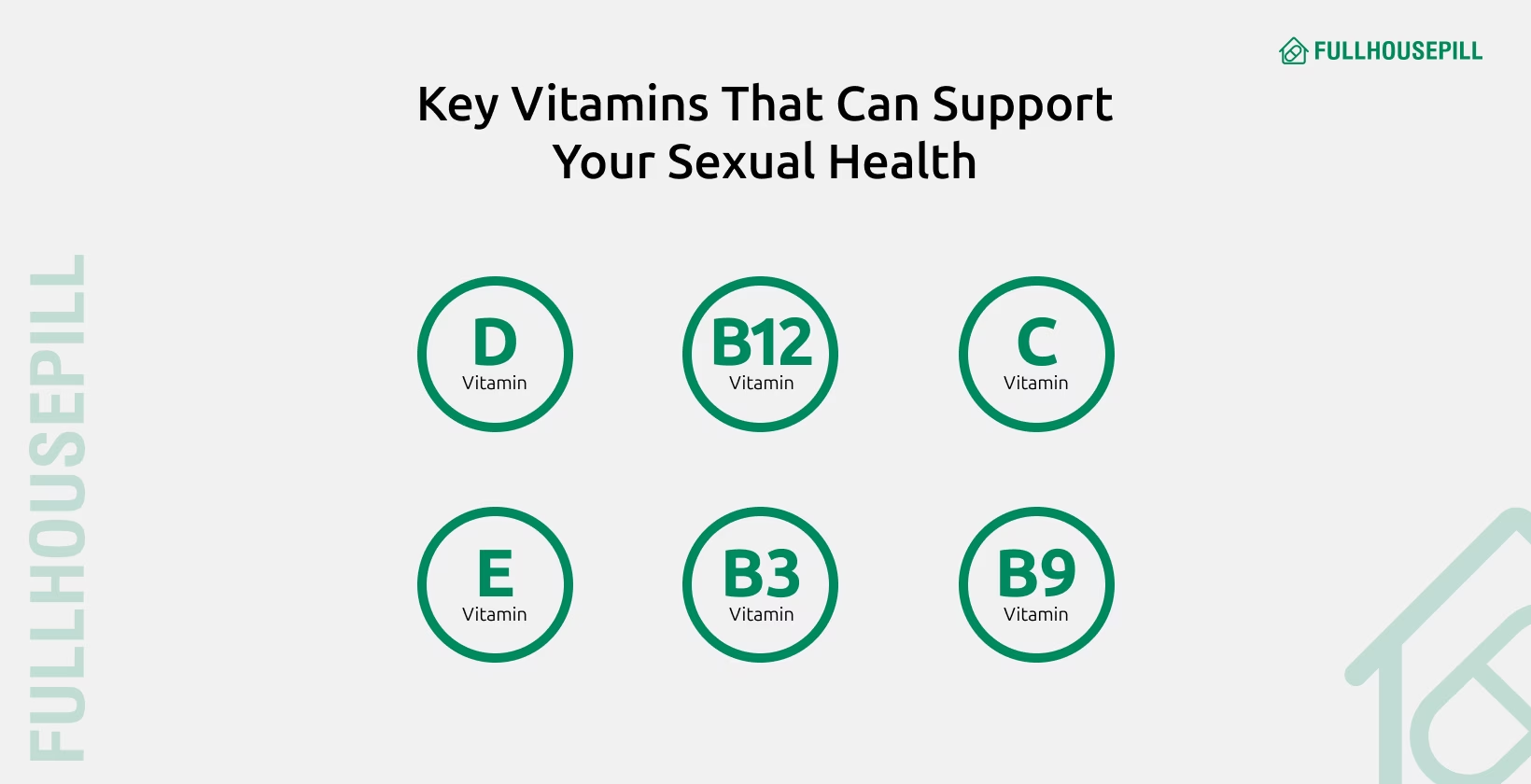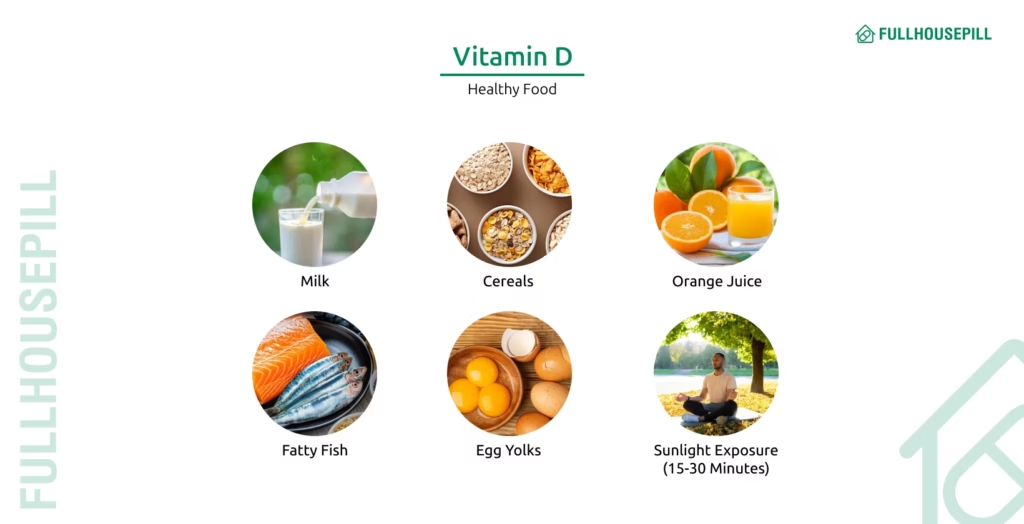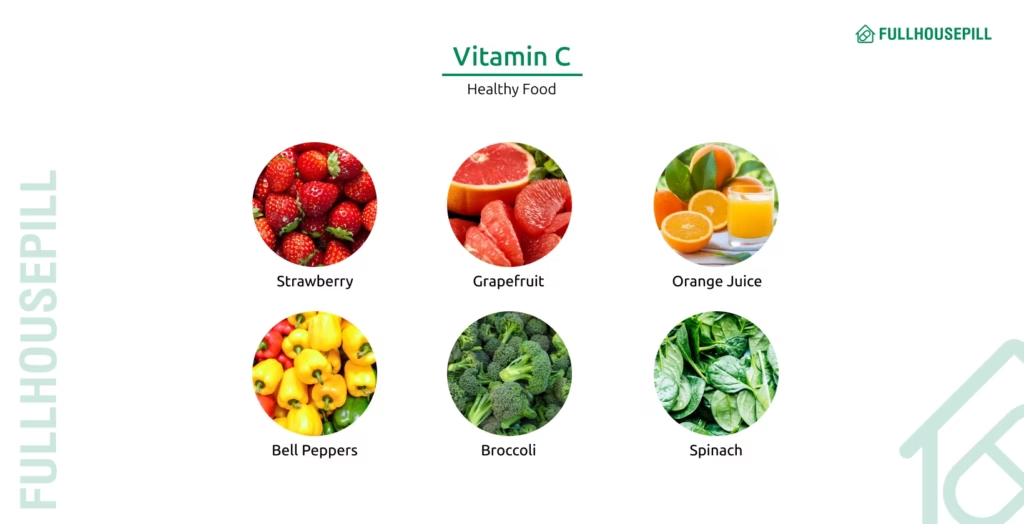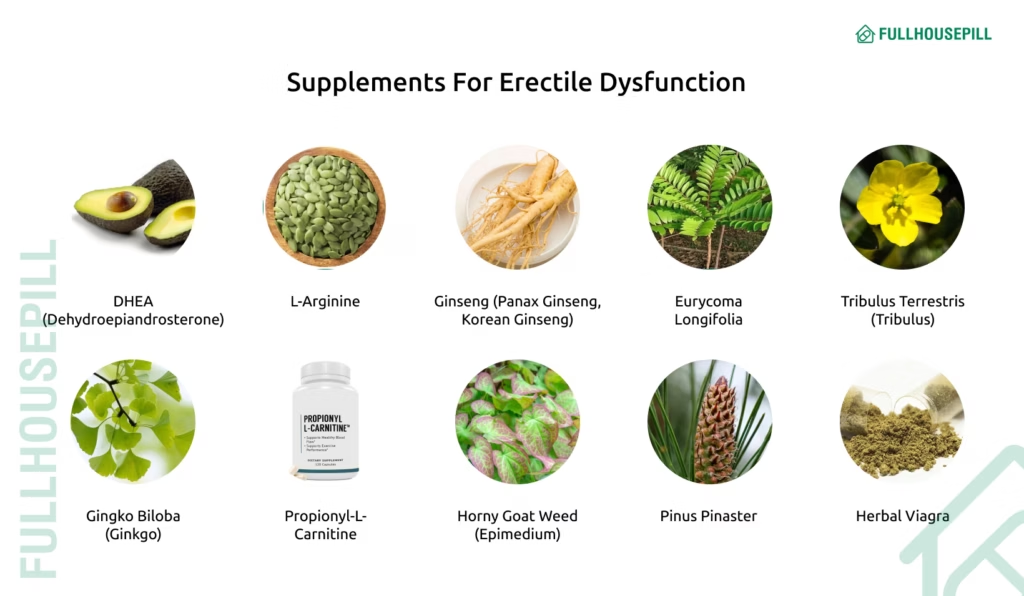Erectile dysfunction (ED) or impotence is the consistent inability to attain and maintain a firm erection sufficient for sexual intercourse. Although ED can affect men at any age, the risk rises significantly after age 40. Older men, between the ages of 40 and 70, often find it challenging to sustain erections due to underlying health conditions, a natural consequence of aging. A study published in the Journal of Clinical Medicine identified major risk factors contributing to ED. These factors include chronic health conditions such as heart disease, hypertension, diabetes, and hormonal imbalances, e.g., low testosterone or thyroid hormone. Psychological causes such as stress, performance anxiety, depression, relationship conflicts, and past trauma can also contribute to ED. Certain lifestyle choices, such as smoking, excessive alcohol intake, poor diet, and obesity, are also linked to an increased risk of ED.
Though medications like Viagra and Cialis (PDE5 inhibitors) are effective, some men explore complementary approaches such as vitamins and supplements to enhance erectile function. Older adults with ED may benefit from combining PDE5 inhibitors with targeted supplements, which can support vascular and hormonal health with fewer side effects.
A 2023 review published in Vitamin Nutrition Research has indicated a link between vitamins and sexual function, based on the numerous positive effects on male erectile function. The study further elaborates on the role of vitamin supplements in treating forms of sexual dysfunction such as ED. Vitamins like D, B3 (niacin), and B9 (folic acid), along with supplements such as L-arginine and ginseng, have been long studied for their roles in improving blood flow and supporting sexual function.
This article examines how specific vitamins (D, B12, C, E, B3, B9) and herbal or amino acid-based supplements (L-arginine, DHEA, Tribulus terrestris, Eurycoma longifolia, Ginkgo biloba, propionyl-L-carnitine, horny goat weed, and Pinus pinaster) may reduce ED symptoms and improve sexual performance. Learn how dietary supplementation may influence erectile function and support sexual health.
| Vitamins/Supplements | Mechanism of Action | Effect on ED |
| Vitamin D | Supports NO (Nitric Oxide) production | Improves endothelial health by improving blood flow to the penis |
| Vitamin B12 | Regulates testosterone, and provides oxygen and important nutrients to the penis | Enhances sexual arousal and performance |
| Vitamin C | Protects from oxidative damage, involved in NO production | Sustaining a healthy libido and sexual desire. |
| Vitamin E | May play a role in preventing oxidative damage, sperm motility, and health | May enhance the effect of Sildenafil (Viagra) in diabetic men with ED |
| Vitamin B3 | Regulates cholesterol for optimal blood flow and extracts cellular energy from food. | Improving blood circulation to the penis, improving physical endurance, and sexual stamina |
| Vitamin B9 | Helps relax the blood vessels for penile erection, NO production | May be prescribed along with oral ED pills to improve erectile function and ED severity |
| DHEA | Known precursor for testosterone production, low levels are linked to fatigue and depression | Optimal DHEA levels in the body influence sexual desire in men, driving erectile function and libido |
| Ginseng | Active compounds in Ginseng improve blood flow, reduce stress | Supports endothelial function and reduces psychological stressors linked to ED |
| L-arginine | Precursor to NO production | Improves blood flow, erection quality, and duration |
| Tribulus terrestris | Traditional use in increasing sexual vitality and libido | May enhance erectile function in men with mild to moderate ED |
| Eurycoma longifolia | Boosts testosterone levels and semen quality | May improve erectile function and firmness by increasing testosterone levels |
| Gingko biloba | Contains flavonoids and terpenoids known for relaxing blood vessels, regulating mood, and stress levels | Improves blood flow, directly impacts libido, and sexual stamina |
| Propionyl-L-carnitine | Supports energy metabolism and enhances NO production | Influences sexual stamina and performance; PLC is sometimes prescribed with L-arginine and Vitamin B3 as an alternative ED treatment |
| Horny goat weed | Active compound, Icariin, increases NO production and has anti-inflammatory properties | Improves erectile response and circulation |
| Pinus pinaster | Active compounds pycnogenol and procyanidins strengthen NO production | Improves dilation of blood vessels for firmer erections; often prescribed with L-arginine for mild to moderate ED. |
| Zinc | Maintains optimal testosterone levels | Improves erectile function and libido; low zinc levels affect the sense of smell, playing a key role in sexual arousal. |
| Magnesium | Regulates testosterone levels, improves sleep quality, and lowers fatigue | Improves erectile function, maintains sexual stamina |
How do vitamins affect erectile dysfunction?
Vitamins are essential organic compounds that support critical body functions, including vascular and hormonal health relevant to erectile function. Various vital functions of vitamins include testosterone regulation, improving blood circulation, effective energy metabolism, and reducing cellular stress, all of which contribute to optimal sexual function. They also play a surprisingly powerful role in maintaining libido behind the scenes, like mood and stress management through delicate hormonal balance.

Vitamins such as Vitamin D, B3, B9, and E have been reported to support testosterone production and elevate male libido and overall sexual performance. A systematic review in 2021 showed that vitamin deficiencies, such as Vitamin D, B12, and B3, can contribute to sexual dysfunction in men and women. Several animal studies also reported that Vitamin E deficiency led to lower testicular weight in mice, indicating testicular damage.
Although vitamin deficiency is increasingly linked to ED, some studies reveal conflicting results, indicating the need for further research to clarify the potential benefits of vitamin supplementation in improving erectile function. Refer to the list below for the key vitamins that can support your sexual health.
Vitamin D
Vitamin D remains one of the most studied vitamins in ED treatment. It’s popularly known as the “sunshine vitamin” because our bodies can produce Vitamin D through exposure to sunlight. Vitamin D plays a crucial role in regulating endothelial health, vital for maintaining sufficient blood flow during erections. A systematic review published in Biomolecules in 2023 reported that vitamin D deficiency can impair NO (nitric oxide) production, a well-known vasodilator involved in penile erections. Another 2023 study highlighted that Vitamin D-deficient men had a significantly higher superoxide production, which can damage penile tissues and reduce NO availability for erectile function. The best sources of Vitamin D include:

- Sunlight exposure (15-30 minutes)
- Fatty fish such as salmon, mackerel, sardines, tuna, and anchovies
- Egg Yolks
- Vitamin D-fortified foods (milk, cereals, orange juice)
Vitamin B12
Vitamin B12 supports sexual health by facilitating better circulation of oxygen and vital nutrients to the penis, supporting erectile response. Adequate levels of Vitamin B12 also help regulate testosterone, the principal male sex hormone, which influences libido, mood, and energy, all of which impact sexual function. A 2021 cross-sectional study published in Wiley evaluated 134 ED patients and found consistent Vitamin B12 deficiency, especially in the younger ED patients. There’s also emerging, yet not conclusive, scientific evidence linking vitamin B12 to sperm quality and male fertility. The top food sources of Vitamin B12 are:

- Fatty fish (salmon, trout)
- Meat (beef, poultry)
- Eggs and dairy (milk, yoghurt, cheese)
Vitamin C
Vitamin C is a powerful antioxidant that also supports erectile function and vascular health. It is a powerful antioxidant that helps reduce cellular oxidative stress, which can impair sexual performance and desire. Lower oxidative stress protects the blood vessels from damage and keeps the circulation strong for sexual arousal and satisfaction. It is also involved in testosterone production, the male hormone responsible for sustaining healthy libido and enhancing sexual responsiveness. A 2010 systematic review established that Vitamin C plays an indirect role in nitric oxide (NO) synthesis and release, helping achieve and maintain hard erections. Dietary sources of Vitamin C are:

- Citrus Fruits (orange, lemon, grapefruit)
- Berries (strawberry, blueberry, raspberry)
- Bell Peppers (red, yellow, green)
- Broccoli, Brussels sprouts, and Spinach
Vitamin E
Vitamin E is an antioxidant that reduces oxidative damage to blood vessels, promoting healthy dilation and erectile function. Studies have shown that Vitamin E may also play a role in protecting sperm health and motility from oxidative damage. A meta-analysis of 23 randomised placebo-controlled trials published in The World’s Journal of Men’s Health reported that antioxidant supplementation (Vitamin E and others) significantly improved erectile function in men with more severe ED, with minimal side effects compared to placebo. Animal studies with a diabetic mouse model also demonstrated that Vitamin E enhanced the pharmacological effect of Sildenafil (viagra) and can support erectile function in diabetic men with ED. Foods rich in Vitamin E are:

- Nuts and seeds (sunflower, almond)
- Vegetable oils (wheat germ, sunflower)
- Green leafy vegetables (spinach, kale, broccoli)
Vitamin B3
Vitamin B3 (Niacin) supports vascular function and metabolic energy production. It helps lower cholesterol by dilating blood vessels and promoting healthy arteries for ample blood flow to the penis. It also plays a key role in synthesising important co-enzymes, which help extract cellular energy from food. The cellular energy can then be used to improve physical endurance and stamina during sexual intercourse. According to the 2015 study published in The Journal of Sexual Medicine, a study involving 160 men with ED and dyslipidemia (high levels of cholesterol and triglycerides in blood) reported significant improvements in erectile function with a daily dosage of up to 1500mg of oral Vitamin B3 (Niacin) for 12 weeks. This shows that Niacin may help reduce ED risk by lowering triglyceride levels, which is a major contributing factor to ED. Dietary sources of Vitamin B3 include:

- Lean Meat (chicken breast, pork tenderloin, beef liver, wild salmon, tuna)
- Peanuts
- Whole wheat
- Mushrooms, Green peas, Sweet potatoes
Vitamin B9
Vitamin B9 (folic acid/folate) plays a key role in nitric oxide synthesis. This potent vasodilator helps relax the blood vessels in the penis for increased blood flow and erection. Some studies have shown a clear link between folate deficiency and ED risk. A 2020 study published in the American Society of Andrology found that 50 men with moderate to severe ED showed significant improvements in erectile function upon folate administration daily for 3 months. This shows that folate helps improve blood flow to the penis by supporting NO production, which is crucial for erectile function. A 2021 systematic review and meta-analysis published in Wiley analysed 44 studies with 3853 men, concluding that daily folic acid supplementation with prescribed PDE5 inhibitors was associated with significant improvement in ED severity. However, more research is required to establish the molecular mechanisms involved. Folate-rich foods to support your sexual health are:

- Leafy greens (spinach, arugula, kale)
- Legumes (lentils, chickpeas, black beans)
- Citrus fruits (orange, lemon, grapefruit)
- Eggs
Erectile Dysfunction is a complex condition with many contributing factors, such as poor diet, habits, lifestyle, mental health, and chronic conditions like diabetes, cardiovascular, or neurological conditions. A balanced lifestyle supported by essential vitamins may reduce ED risk, enhance circulation, and improve sexual performance.
What are the supplements for erectile dysfunction?
Supplements for erectile dysfunction include a growing list of natural compounds that may help address poor circulation, low testosterone, nutritional deficiencies, and psychological stressors. Supplements like DHEA, ginseng, and L-arginine have shown limited but encouraging clinical data, supporting their role as adjunctive treatments in erectile dysfunction.

DHEA (dehydroepiandrosterone)
DHEA (dehydroepiandrosterone) is a steroid hormone, naturally produced by our adrenal glands. It acts as a precursor in testosterone production, playing a key role in libido, erection quality, and sexual performance. DHEA levels decline with age and may be linked to depression and fatigue, which heavily influence sexual desire in men. Several studies, including the 1994 study by the Massachusetts Male Aging Study, reported a link between low DHEA serum levels and ED risk. Another study confirmed that DHEA serum levels were significantly lower in men with ED. However, some studies show conflicting results where DHEA showed no significant improvement in erectile function and sexual performance, especially in men with underlying cardiovascular issues. More research is needed to uncover the role of DHEA in sexual function, especially in younger men with ED. While DHEA is produced endogenously, a healthy diet rich in fats and protein may support overall hormonal balance. Refer to the list below for foods that help in optimal DHEA production.
- Avocados
- Olive Oil
- Nuts and Seeds
- Fatty Fish (salmon, mackerel, sardines)
- Eggs
- Grass-fed meats (beef, lamb)
Ginseng (Panax ginseng, Korean ginseng)
Ginseng, popularly known as Korean ginseng or Panax Ginseng, has a long history in traditional asian medicine. Used for centuries in East Asian medicine, ginseng contains ginsenosides that may be linked to improved blood flow to the penis by relaxing the smooth muscles and boosting nitric oxide production. Ginseng is also a popular adaptogen, which helps the body cope better with daily stressors and psychological factors that may lead to ED, as evidenced by the 2008 systematic review published in the British Journal of Clinical Pharmacology.
In 2002, the Journal of Urology published a double-blind study including 45 patients with moderate to severe ED, who showed significant improvement in penile penetration and erection maintenance after treatment with Korean red ginseng for 12 weeks. Clinical effects are typically observed after 8–12 weeks of consistent supplementation. However, modern medical science needs more rigorous studies to back up the traditional claims of this ancient herb. Ginseng is available as extracts, capsules, teas, and powders for easy supplementation.
L-arginine
L-arginine is an amino acid and is a direct precursor of nitric oxide, a known vasodilator for achieving and maintaining penile erections. L-arginine is also more commonly used as an additional agent with PDE5 inhibitors like Viagra or Cialis to help enhance the effects and work synergistically with other molecules to improve erection quality and duration. Combination therapy with L-arginine and PDE5 inhibitors showed modest but measurable improvements in erectile rigidity and duration. However, the limited number of positive studies limits our understanding of its efficacy in the ED. Dietary sources of L-arginine are:
- Pumpkin seeds
- Soybeans
- Lean meats (turkey and chicken breast)
- Peanuts
Tribulus terrestris (Tribulus)
Tribulus terrestris, otherwise known as Tribulus (a herb), has been gaining attention for its ancient use in Ayurveda and Traditional Chinese Medicine as a sexual enhancer and aphrodisiac. In addition to its traditional use in enhancing sexual vitality and libido in both men and women, it has also been documented to have uses in treating urinary tract infections (UTI) and other inflammatory conditions.
The exact mechanism of Tribulus in improving ED symptoms is not fully understood, but a recent systematic review published in Nutrients (2025) has reported that daily Tribulus supplementation (400-700mg/day for 3 months) has led to erectile function improvements in men suffering from mild-to-moderate ED.
Eurycoma longifolia
Eurycoma longifolia (EL), also known as Tongkat Ali or Longjack, has a long history of traditional use in Southeast Asian culture as a potent remedy for male sexual dysfunction, such as ED. Its root is usually used as a dietary supplement for bodybuilders and has been known to enhance testosterone levels, semen quality, and erectile function, contributing to a stronger display of athleticism.
In 2017, the Chinese Journal of Natural Medicines published a systematic review of clinical studies performed on Eurycoma longifolia’s efficacy as a potential ED treatment and found seven promising human clinical trials that link EL to overall improved sexual function. The study reports its role in penile erection, erectile firmness, and better sexual performance by significantly increasing testosterone levels and semen volume.
Gingko biloba (Ginkgo)
Gingko biloba, or Gingko, traditionally used in Chinese medicine, is known for its use for respiratory conditions like asthma and bronchitis, and other ailments. Gingko leaf extracts contain flavonoids and terpenoids, which are known vasodilatory agents, improving blood flow by relaxing the penile muscles. Its antioxidant properties help protect penile blood vessels and nerve cells from damage. It also functions as an adaptogen, which supports mood and stress regulation, directly impacting libido and sexual stamina. Although limited scientific literature is available to confirm its efficacy in ED, A 2008 study published in the Journal of Sex & Marital Therapy reported 76% improvement in treating antidepressant-induced sexual dysfunction in men. The men exhibited notable positive effects during all 4 sexual response phases: desire, excitement(erection), orgasm, and resolution(afterglow).
Propionyl-L-carnitine
Propionyl-L-carnitine (PLC) is a specialised form of L-carnitine which is becoming popular for its potential to support male sexual health and ED linked to aging, metabolic issues, and poor circulation. PLC enhances blood flow by boosting nitric oxide production, crucial for sustaining erections. It also supports energy metabolism, enhancing sexual stamina and overall sexual performance. Since ED is often tied to underlying cardiovascular issues, PLC’s antioxidant and anti-inflammatory properties may help protect the blood vessels from radical damage. A study published in the Andrologia Journal (2012), exploring the synergistic effects of PLC with L-arginine and Niacin (Vitamin B3) as an alternative ED treatment, showed up to 77% improvement in erectile function in 40% of men with ED after 3 months.
Horny goat weed (Epimedium)
Horny goat weed, or Epimedium, is a traditional Chinese herb believed to have PDE5 inhibiting properties (same enzyme targeted by ED drugs) which can increase nitric oxide production and lead to improved blood flow to the penis for harder erections. The active component in horny goat weed is icariin, showing promising results in animal studies by improving erectile response and blood flow. Icariin also showcases cholesterol-lowering, anti-inflammatory properties, which address various ED risk factors. Although animal studies have been concluded with positive results, it’s unclear whether the same benefits would be seen in humans.
Pinus pinaster
Pinus pinaster, also known as French maritime pine, is the source of pycnogenol, a standard extract showing promising support in erectile function. It’s rich in procyanidins, known to increase nitric oxide production and improve dilation of penile blood vessels for improved circulation and more viable erections. Combination therapy using pycogenol and L-arginine has shown remarkable results, where one clinical trial, published in the Journal of Sex & Marital Therapy (2003), reported restored erectile function in 92.5% of men, aged 25-40 years, with mild to moderate ED after three months of supplementation.
Herbal Viagra and other tainted products
Many products are currently being marketed that claim to be an over-the-counter herbal form of Viagra. These medications contain various similar active ingredients to traditional prescription medications. However, they are unregulated products and are not approved by the FDA for ED treatment. Some “tainted” products sold as male enhancement supplements or ED treatments may contain unsafe hidden ingredients, which can cause adverse reactions if taken with other medications and pose serious health risks. It is strongly advised to take prior consultation with your healthcare provider before using any form of supplements.
What are the minerals for erectile strength?
Mineral deficiencies in your diet can potentially increase your chances of ED. A 2022 study published by the National Institute of Health, including 3745 study participants, has confirmed that lower dietary intake of essential minerals such as zinc, magnesium, and copper can be linked to a higher ED prevalence. These essential minerals are actively involved in antioxidant and cholesterol metabolism, directly impacting testosterone production and blood flow for viable erections. A mineral deficiency significantly increases the risk of stroke, hypertension, atherosclerosis, and other chronic conditions, all of which are important predictors of ED. Let us understand how these essential minerals support erectile strength and function.
Zinc
Zinc is a trace mineral and is essential for male sexual development. Low levels of zinc can affect testes development and can lead to a lower sperm count. Zinc is also involved in maintaining optimal testosterone levels and preserving erectile function through its anti-inflammatory activities. Most studies on male infertility and ED show a clear link between zinc levels and ED. In a 1996 study, young men were given a low-zinc diet to develop a zinc deficiency. When their testosterone levels were measured after 20 weeks, there was a significant decrease in the hormone level. The study also found that with an increase in zinc uptake, testosterone levels in elderly men nearly doubled. Animal studies on rats also confirm that a 5 mg daily zinc supplement resulted in better sexual function, such as libido, number of penile thrusts, and mounts. Zinc deficiency is also linked to a reduced sense of smell, which greatly impacts libido, especially in younger men. Thus, it can cause a person to lose the ability to detect certain pheromones or chemicals that stimulate and maintain sexual arousal in men. Dietary sources of zinc are:
- Nuts (cashews, almonds)
- Lentils, chickpeas, beans
- Pumpkin seeds
- Oysters, crab, shrimp
Magnesium
Magnesium is a quiet powerhouse in its contributions to male sexual health. It helps boost testosterone levels by lowering sex hormone-binding globulin (SHBG). Magnesium also supports nitric oxide production, a key molecule contributing to erectile strength and duration. Magnesium also helps improve sleep quality and energy metabolism, preventing poor sleep and fatigue, which can reduce sexual stamina. A 2017 cross-sectional study published in the National Library of Medicine involving 372 elderly patients showed that men with hypomagnesemia (magnesium deficiency) had a higher prevalence of ED compared to those with normal magnesium levels. Even though the exact mechanisms are still being studied, magnesium is a potent mineral crucial for penile erections, testosterone production, and overall sexual health. Some magnesium-rich foods are:
- Pumpkin seeds
- Leafy green vegetables (spinach, kale)
- Nuts (Almonds, cashews)
- Whole grain (quinoa, oats)
- Black beans and lentils
How To Increase Blood Flow To the Penis Naturally?
To naturally increase blood flow to the penis, focus on improving circulation, reducing stress, and supporting vascular and hormonal health through evidence-based lifestyle changes. The following list outlines effective natural methods, ranging from targeted supplements to everyday habits, that can enhance erectile function without medication.
- Take Key Supplements and Vitamins
Supplements like L-arginine, vitamin D, ginseng, yohimbe, and horny goat weed may support better blood flow. L-arginine helps dilate blood vessels, while vitamin D supports endothelial health. Yohimbe and horny goat weed have traditional uses in treating ED. - Follow a Mediterranean Diet
A Mediterranean-style diet rich in fruits, vegetables, whole grains, seafood, olive oil, and nuts may improve vascular function and reduce ED risk. Avoid processed foods, added sugars, and red meat. - Exercise Regularly
Aerobic activities like brisk walking, cycling, swimming, or jogging improve circulation and reduce ED symptoms. Aim for 30–45 minutes of moderate-intensity exercise most days. - Manage Stress Effectively
Chronic stress and anxiety reduce blood flow and raise ED risk. Use methods like guided meditation, deep breathing, nature walks, or talking to a friend to stay calm. - Get Regular Massages
Massage helps relieve muscle tension and increase general circulation. It can also reduce stress-related ED triggers and improve mood. - Stay Hydrated
Drink up to 3.7 litres of water daily to avoid dehydration, which can increase anxiety and impair sexual function. - Quit Smoking
Smoking restricts blood vessels and impairs circulation. Quitting improves erection quality in over 25% of men within a year. - Limit Alcohol and Recreational Drugs
Excessive alcohol and drugs affect vascular function and hormone balance. Reducing intake can improve erectile health. - Sleep Well
Sleep deprivation affects hormone levels and stress. Aim for 7–8 hours of quality sleep nightly to support blood flow and testosterone production.
What Are The Best Ways To Get Stronger Erections?
To get stronger erections, you need to support healthy blood flow, optimize hormone levels, and reduce factors that interfere with arousal. A combination of daily habits, lifestyle changes, and medical guidance can significantly improve erection quality over time. For men seeking to get harder erections naturally, the following evidence-backed methods are worth considering.

1. Improve Cardiovascular Health
Erections rely on strong blood circulation. Regular aerobic exercise, like jogging, cycling, or swimming, strengthens the heart and improves blood flow to the penis. Aim for at least 30 minutes of moderate activity most days of the week.
2. Eat a Vascular-Friendly Diet
A diet rich in leafy greens, whole grains, nuts, berries, and healthy fats can help reduce plaque buildup in blood vessels. The Mediterranean diet is particularly effective in supporting both erectile and overall health.
3. Sleep Well and Manage Stress
Poor sleep affects testosterone production, and chronic stress can trigger cortisol spikes that reduce libido and erectile strength. Prioritize 7–8 hours of quality sleep and use relaxation tools like meditation, deep breathing, or yoga.
4. Strengthen Pelvic Muscles
Pelvic floor exercises, like Kegels, enhance the strength and endurance of the muscles involved in erection. These exercises can improve rigidity and control during intercourse.
5. Limit Harmful Habits
- Quit smoking: Tobacco use damages blood vessels and restricts penile blood flow.
- Reduce alcohol: Excessive drinking interferes with the neural signals required to initiate an erection.
- Cut back on cycling: Long hours on a bike can compress nerves and arteries in the pelvic region.
6. Address Medical and Psychological Factors
Conditions like diabetes, hypertension, or high cholesterol can reduce erection strength. Psychological issues like anxiety and performance pressure may also play a role. Seek medical evaluation to rule out or manage these factors.
7. Consider Natural Supplements
L-arginine, ginseng, and vitamin D are commonly used supplements that may enhance blood flow and erectile quality. Always consult a healthcare provider before starting any supplement.
Can Food Help Improve Erectile Dysfunction?
Yes, food can help improve erectile dysfunction by boosting blood flow, supporting hormone levels, and improving vascular health. The link between food and ED is mainly through nutrients that enhance nitric oxide production and circulation. Leafy greens, beets, and watermelon increase nitric oxide levels. Fatty fish, olive oil, and nuts provide healthy fats that protect blood vessels. Zinc-rich foods like pumpkin seeds support testosterone. Antioxidant-rich fruits and dark chocolate reduce oxidative stress. Avoid processed foods, excess alcohol, sugary drinks, and fried items, as they harm circulation and hormone balance. A balanced diet, along with exercise and stress control, forms a strong natural defence against ED.
Do Vitamins Help With Weak Erections?
Yes, vitamins can support erectile health, but they are not a standalone treatment for weak erections. Certain deficiencies may contribute to erectile dysfunction, and correcting them can help improve sexual function over time. However, vitamins alone won’t resolve ED without addressing the underlying causes. Key vitamins linked to erectile health are listed below.
- Vitamin D: Supports blood vessel function; low levels are often linked to ED.
- Vitamin B3 (Niacin): May improve blood flow, especially in men who can’t take PDE5 inhibitors.
- Vitamin B9 (Folate) and B12: Important for cardiovascular and nerve health, both critical for erections.
- Zinc: Essential for testosterone production and sexual function.
While these nutrients can help, always consult a healthcare provider before starting supplements. A healthy lifestyle, including a balanced diet, regular exercise, and stress reduction, remains essential for improving and maintaining erectile function.
What Are Alternative Ways To Treat Erectile Dysfunction?
Alternative treatments for erectile dysfunction include lifestyle changes, psychological therapy, and non-drug interventions that may improve erection quality over time. These approaches target the root causes of ED, such as poor circulation, hormonal imbalance, stress, or relationship issues, rather than offering short-term relief alone. Lifestyle changes are often the first line of natural intervention:
- Follow a heart-healthy diet with fruits, vegetables, whole grains, lean protein, and healthy fats to support vascular health.
- Exercise regularly, especially with aerobic activities and Kegel exercises, to improve blood flow and strengthen pelvic muscles.
- Maintain a healthy weight, as abdominal obesity is linked to hormonal imbalance and vascular problems.
- Quit smoking and reduce alcohol, both of which impair circulation and testosterone levels.
- Prioritize sleep and reduce stress through yoga, mindfulness, or structured therapy. Poor sleep and high cortisol can both suppress sexual function.
Psychological therapies such as cognitive behavioral therapy (CBT), sex therapy, or couples counseling can reduce performance anxiety and resolve relational conflict, both of which commonly affect erections. Complementary therapies include acupuncture and herbal supplements. Some men report improvements with Panax ginseng, yohimbine, or L-arginine, though these should only be used under medical guidance due to potential side effects or interactions. In moderate to severe cases, some may consider physical interventions such as vacuum pumps or implants, but these are often reserved for when other methods fail.
What Are The Best Medications For Erectile Dysfunction?
To find the most suitable treatment for erectile dysfunction, consult a healthcare professional. A tailored combination of medical and lifestyle therapies typically offers the best long-term results. The best medications for erectile dysfunction are PDE5 inhibitors like sildenafil, tadalafil, vardenafil, and avanafil, which enhance blood flow to the penis during sexual stimulation. These drugs are the first-line treatment for ED due to their high success rate and oral convenience.
- Sildenafil (Viagra): Typically effective within 30 to 60 minutes and lasts up to 4 hours. Ideal for planned sexual activity.
- Tadalafil (Cialis): Offers flexible dosing, daily or on-demand, and lasts up to 36 hours. Suitable for more spontaneous encounters.
- Vardenafil (Levitra): Works similarly to sildenafil but may have fewer digestive side effects.
- Avanafil (Stendra): Has a faster onset and potentially fewer side effects, making it a convenient option.
While these are considered the best ED medication options for many men, safety depends on individual health profiles. Men taking nitrates or with serious heart conditions must avoid PDE5 inhibitors. If oral medications aren’t suitable, options like penile injections, vacuum erection devices, or implants may be recommended. Always consult a healthcare provider to choose the most effective and safe treatment based on your specific condition and needs.
